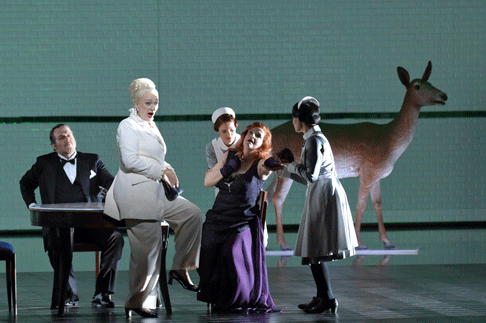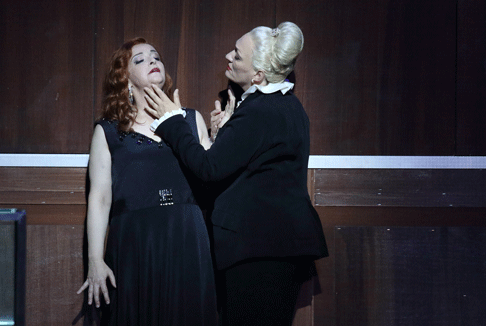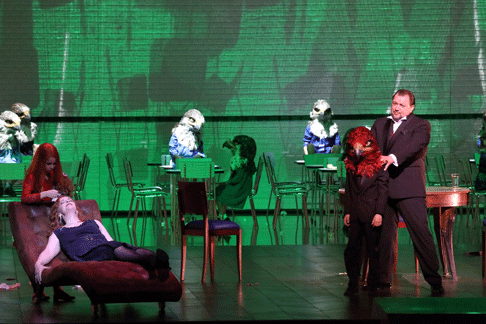![Elena Pankratova (Färberin), Statisterie der Bayerischen Staatsoper [Photo © Wilfried Hösl]](http://www.operatoday.com/P_O_Die_Frau_ohne_Schatten_09.png)
09 Jul 2017
Die Frau ohne Schatten at Munich
It was fascinating to see — and of course, to hear — Krzysztof Warlikowsi’s productions of Die Gezeichneten and Die Frau ohne Schatten on consecutive nights of this year’s Munich Opera Festival.
English Touring Opera are delighted to announce a season of lyric monodramas to tour nationally from October to December. The season features music for solo singer and piano by Argento, Britten, Tippett and Shostakovich with a bold and inventive approach to making opera during social distancing.
This tenth of ten Live from London concerts was in fact a recorded live performance from California. It was no less enjoyable for that, and it was also uplifting to learn that this wasn’t in fact the ‘last’ LfL event that we will be able to enjoy, courtesy of VOCES8 and their fellow vocal ensembles (more below …).
Ever since Wigmore Hall announced their superb series of autumn concerts, all streamed live and available free of charge, I’d been looking forward to this song recital by Ian Bostridge and Imogen Cooper.
Although Stile Antico’s programme article for their Live from London recital introduced their selection from the many treasures of the English Renaissance in the context of the theological debates and upheavals of the Tudor and Elizabethan years, their performance was more evocative of private chamber music than of public liturgy.
Evidently, face masks don’t stifle appreciative “Bravo!”s. And, reducing audience numbers doesn’t lower the volume of such acclamations. For, the audience at Wigmore Hall gave soprano Elizabeth Llewellyn and pianist Simon Lepper a greatly deserved warm reception and hearty response following this lunchtime recital of late-Romantic song.
For this week’s Live from London vocal recital we moved from the home of VOCES8, St Anne and St Agnes in the City of London, to Kings Place, where The Sixteen - who have been associate artists at the venue for some time - presented a programme of music and words bound together by the theme of ‘reflection’.
'Such is your divine Disposation that both you excellently understand, and royally entertaine the Exercise of Musicke.’
‘And there was war in heaven: Michael and his angels fought against the dragon; and the dragon fought and his angels, And prevailed not; neither was their place found any more in heaven … that old serpent … Satan, which deceiveth the whole world: he was cast out into the earth, and his angels were cast out with him.’
There was never any doubt that the fifth of the twelve Met Stars Live in Concert broadcasts was going to be a palpably intense and vivid event, as well as a musically stunning and theatrically enervating experience.
‘Love’ was the theme for this Live from London performance by Apollo5. Given the complexity and diversity of that human emotion, and Apollo5’s reputation for versatility and diverse repertoire, ranging from Renaissance choral music to jazz, from contemporary classical works to popular song, it was no surprise that their programme spanned 500 years and several musical styles.
The Academy of St Martin in the Fields have titled their autumn series of eight concerts - which are taking place at 5pm and 7.30pm on two Saturdays each month at their home venue in Trafalgar Square, and being filmed for streaming the following Thursday - ‘re:connect’.
The London Symphony Orchestra opened their Autumn 2020 season with a homage to Oliver Knussen, who died at the age of 66 in July 2018. The programme traced a national musical lineage through the twentieth century, from Britten to Knussen, on to Mark-Anthony Turnage, and entwining the LSO and Rattle too.
With the Live from London digital vocal festival entering the second half of the series, the festival’s host, VOCES8, returned to their home at St Annes and St Agnes in the City of London to present a sequence of ‘Choral Dances’ - vocal music inspired by dance, embracing diverse genres from the Renaissance madrigal to swing jazz.
Just a few unison string wriggles from the opening of Mozart’s overture to Le nozze di Figaro are enough to make any opera-lover perch on the edge of their seat, in excited anticipation of the drama in music to come, so there could be no other curtain-raiser for this Gala Concert at the Royal Opera House, the latest instalment from ‘their House’ to ‘our houses’.
"Before the ending of the day, creator of all things, we pray that, with your accustomed mercy, you may watch over us."
The doors at The Metropolitan Opera will not open to live audiences until 2021 at the earliest, and the likelihood of normal operatic life resuming in cities around the world looks but a distant dream at present. But, while we may not be invited from our homes into the opera house for some time yet, with its free daily screenings of past productions and its pay-per-view Met Stars Live in Concert series, the Met continues to bring opera into our homes.
Music-making at this year’s Grange Festival Opera may have fallen silent in June and July, but the country house and extensive grounds of The Grange provided an ideal setting for a weekend of twelve specially conceived ‘promenade’ performances encompassing music and dance.
There’s a “slide of harmony” and “all the bones leave your body at that moment and you collapse to the floor, it’s so extraordinary.”
“Music for a while, shall all your cares beguile.”
The hum of bees rising from myriad scented blooms; gentle strains of birdsong; the cheerful chatter of picnickers beside a still lake; decorous thwacks of leather on willow; song and music floating through the warm evening air.
![Elena Pankratova (Färberin), Statisterie der Bayerischen Staatsoper [Photo © Wilfried Hösl]](http://www.operatoday.com/P_O_Die_Frau_ohne_Schatten_09.png)
It was fascinating to see — and of course, to hear — Krzysztof Warlikowsi’s productions of Die Gezeichneten and Die Frau ohne Schatten on consecutive nights of this year’s Munich Opera Festival.
First, and perhaps most important: both received outstanding performances, fully worthy of any festival in the world, let alone one such as this which offers both new productions and stagings from the repertory. This FroSch may have been the latter, but who would have known? There are clearly advantages to being conducted by the Music Director — not least the identity of this particular music director — but even so…
Both works offered the director considerable challenges. In the Schreker opera, Warlikowski rose admirably to the challenge of drawing out what was of greatest interest in a flawed work and, indeed, even to criticising certain of its more problematical aspects. Die Frau ohne Schatten is not without its problematical aspects either, of course, not least Hofmannsthal’s bizarre pronatalism — perhaps a staging that made more of its wartime origins might help, but I have yet to see one — and, more broadly, the mismatch between Strauss and Hofmannsthal here. If Strauss misunderstands Hofmannsthal, though — and we should be wary of awarding priority simply on a chronological basis, especially with so complex a composer-librettist relationship as this — it is, to borrow a term from Webern and the post-war avant garde, a productive misreading.
 Sebastian Holecek (Der Geisterbote), Michaela Schuster (Die Amme), Ricarda Merbeth (Die Kaiserin), Statisterie der Bayerischen Staatsoper
Sebastian Holecek (Der Geisterbote), Michaela Schuster (Die Amme), Ricarda Merbeth (Die Kaiserin), Statisterie der Bayerischen Staatsoper
How does Warlikowski deal with that, in a production first seen in 2013? I am not entirely sure that he does, but it may well be that I am missing something. What he certainly does accomplish is to present a number of standpoints, which may, to an extent, like those presented in the work ‘itself’, be reconciled, or even set against each other. The world of medicalised hysteria, of the sanatorium is present, just as in Claus Guth’s production (seen at La Scala, Covent Garden, and the Berlin State Opera). Perhaps counter-intuitively, for a work in which, laboriously at times, Hofmannsthal at least seems to offer layer upon layer of symbolism, often highly referential or at least allusive, Warlikowski penetrates to a very human drama at the work’s heart. It might sound banal; perhaps in some ways it is; but why not actually present this as a drama concerning a woman, the Dyer’s Wife rather than the Empress, who wishes to have children, is pressured to renounce her desire, and then achieves what would seem to be genuine fulfilment by doing so? There are various answers to that, of course, or at least to why such a drama might be problematical; but they are not unanswerable answers.
Freud hangs less heavily over the production than he does over Guth’s, but he is there, glimpsed indeed in video projections at the end alongside a motley crew that includes (I think) Gandhi, Christ, the Buddha, King Kong, and Marilyn Monroe. (I have no idea, I am afraid; I suspect I am missing something terribly obvious, but never mind…) More overtly present is Last Year in Marienbad. Pictures from the film lead us in to the opening of the opera and accompany its course, far from obtrusively, yet offering connections should we wish to follow them. A sadness born of lack of fulfilment, perceived or otherwise, hangs over what we see — and interacts, sometimes harmoniously, sometimes less so, with what we hear. Even the Nurse seems a far more human figure than usual. There is, perhaps, loss there too, but to see her a broken woman, trying to deal with an impossible situation that is not of her choosing is fascinating: it certainly made me reconsider the role.
 Ricarda Merbeth (Die Kaiserin), Michaela Schuster (Die Amme)
Ricarda Merbeth (Die Kaiserin), Michaela Schuster (Die Amme)
Where Ingo Metzmacher had given a commanding account of Schreker’s score the previous night, Kirill Petrenko went further still in Strauss’s score. It does no harm, of course, that Strauss is by far the greater composer and musical dramatist. But that can come to naught, or at least be severely diminished in the wrong hands. Musical performance is certainly not a matter of league tables, but I can certainly say, hand on heart, that I have never heard the opera better conducted or played. This was at the very least a musical performance to set alongside those by Christoph von Dohnányi and Semyon Bychkov at Covent Garden, and superior to any of the others I have heard. Petrenko’s ear for Strauss’s complex orchestral polyphony is second to none, not only amongst any conductor alive but any I know from recorded performances.
The similarities and differences between Strauss and Schoenberg — you will have to forgive me for having the latter very much on my mind at the moment — are as complex as their music ‘in itself’. There is, though, something here which, ironically, given Strauss’s reported remarks on Schoenberg’s score, brings Strauss closer than one might expect to the Five Orchestral Pieces, op.16. Alma Mahler just could not help herself in telling Schoenberg that Strauss had said Schoenberg would be ‘better off shovelling snow’ than ‘scribbling on manuscript paper’. (What is less often reported is that he recommended the younger composer for the Mahler Foundation grant in any case. Schoenberg, unsurprisingly, never forgave him; when asked the following year for a fiftieth-birthday tribute, he responded angrily: ‘He is no longer of the slightest artistic interest to me, and whatever I may once have learned from him, may God be thanked, [I had] misunderstood.’) Petrenko is a very fine Schoenberg conductor; indeed, it was in Erwartung at Covent Garden that I first heard him. The interplay between colour, line, harmony, every changing parameter was such that I could not help but think I was hearing Strauss with somewhat Schoenbergian ears — and that was not entirely to be attributed to my own present preoccupations. The Bavarian State Orchestra was at least equally responsible: in every respect worthy of the most exalted comparisons, past or present. I do not think I have ever heard the solo cello part played with greater tenderness and yet with such a sense of where, motivically and harmonically, it is heading. Nor have I heard the full orchestra sound more thrillingly present and yet more transparent. It was not only seeing the glass harmonica in one of the boxes overlooking the pit that meant I could hear it so well.
 Ricarda Merbeth (Die Kaiserin), Burkhard Fritz (Der Kaiser), Kinderstatisterie der Bayerischen Staatsoper
Ricarda Merbeth (Die Kaiserin), Burkhard Fritz (Der Kaiser), Kinderstatisterie der Bayerischen Staatsoper
Vocal performances were almost equally magnificent. Burkhard Fritz greatly impressed in Berlin earlier this year, and did so again here: quite tireless and perfectly capable of riding Strauss’s orchestral wave. The Emperor is, perhaps, the best role in which I have heard of him. Ricarda Merbeth was more than his equal as his consort: as tenderly moving as, when required, imperious. She truly drew one into her particular drama, as did the Dyer and his Wife, even, as mentioned above, the Nurse. Elena Pankratova and Wolfgang Koch were also in previous casts I had seen, London and Berlin respectively. Fine though their performances had been then, Petrenko’s conducting seemed to incite them to still greater things in Munich. (The more I consider Zubin Mehta in Berlin, the more uncomprehending his conducting seems by comparison.) Theirs was at root a human, commonplace relationship, exalted by particular musico-dramatic circumstance and by musical performance into something transformative, in a sense that both Strauss and Hofmannsthal might have acknowledged. The sadness both felt could be perceived in their faces, their body language, but still more in the alchemy of stage, words, and music that is opera at its greatest — and which, with the best will in the world, a lesser composer such as Schreker could never have summoned. To her trademark malevolence in the role, Michael Schuster was here fully enabled to offer a poignancy one rarely sees and hears in the Nurse. Sebastian Heleck’s Spirit Messenger was perhaps first among equals — intelligent, deeply musical singing — amongst the ‘smaller’ roles, but there was no weak link here. Choral singing and acting were equally outstanding. Likewise those roles played by non-singing actors: the Apparition of a Youth here our first among equals, sporting an excellent line in gigolo contempt when collecting his earnings for unachieved attempted seduction from the Nurse. As had been the case in the previous night’s performance, the dramatic whole was greater than the sum of its parts — just not quite in the same way. Now how about a Moses und Aron
Mark Berry
Cast and production information:
Nurse: Michaela Schuster; Spirit Messenger: Sebastian Holececk; Emperor: Burkhard Fritz; Empress: Ricarda Merbeth; Voice of the Falcon, Guardian of the Threshold of the Temple: Elsa Benoit; The One-Eyed: Tim Kuypers; The One-Armed: Christian Rieger; The Hunchback, Apparition of a Youth: Dean Power; Dyer’s Wife: Elena Pankratova; Barak: Wolfgang Koch; Serving Maids: Elsa Benoit, Paula Iancic, Rachael Wilson; Voices of Unborn Children: Elsa Benoit, Paula Iancic, Alla El-Khashem, Rachael Wilson, Okka von der Damerau; Voices of Night-Watchmen: Johannes Kammler, Sean Michael Plumb, Milan Siljanov. Director: Krzysztof Warlikowski; Designs: Malgorzata Szczęśniak; Lighting: Felice Ross; Video: Denis Guéguin; Video Animation: Kamil Polak; Abendspielleitung: Georgine Balk; Dramaturge: Miron Hakenbeck; Children’s Chorus (chorus master: Stellario Fagone) and Chorus (chorus master: Sören Eckhoff) of the Bavarian State Opera/Bavarian State Opera/Kirill Petrenko (conductor). Nationaltheater, Munich, Wednesday 5 July 2017.